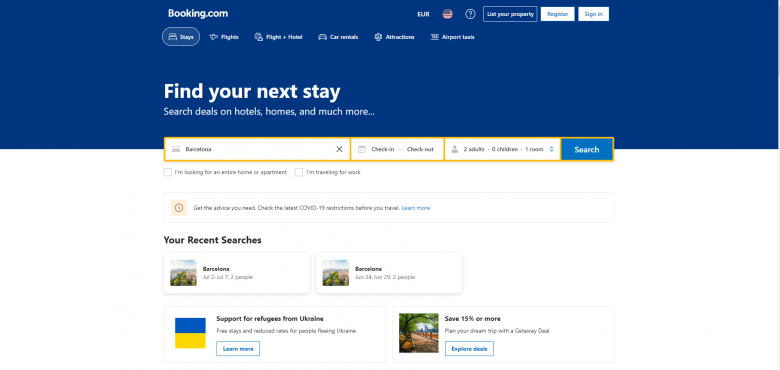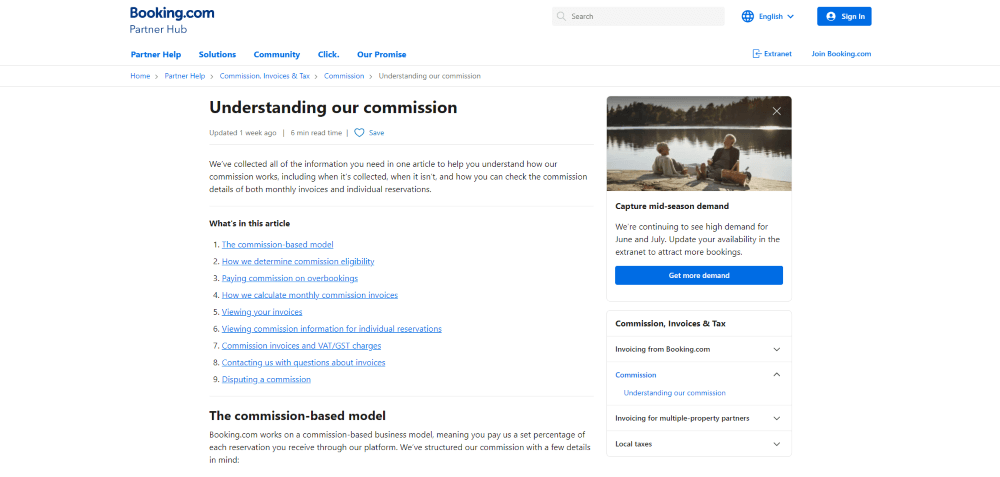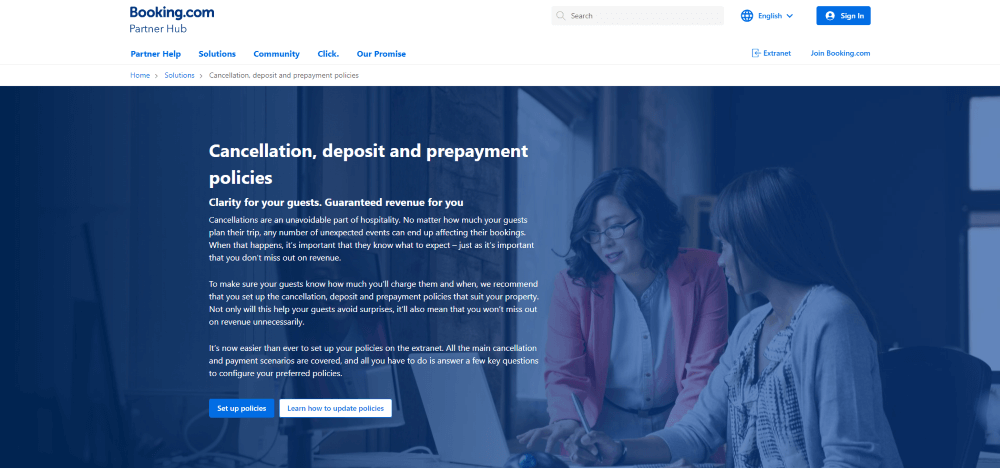Airbnb vs. Booking.com: Which is Right for You?
Whether you’re a professional or just starting out your vacation rental business, you probably know that listing your property on an online travel agency (OTA) is a good way to increase visibility. Which one is right for your business, though? That’s the million-dollar question.
Airbnb probably comes to mind first as the biggest vacation rental website out there. Although Airbnb is a good starting point, it’s recommended that you list on other platforms as well to increase visibility. It´s never a great idea to have all your eggs in one basket, is it?
Historically, Booking.com has specialized in hotel-type accommodations, but they’re catching up with the trends and expanding their focus to include vacation rentals. Both travel industry giants are viable options for your business, so let’s look at the facts and find out which is right for you.
A few fast facts
Airbnb began as a startup in San Francisco in 2008. Since then, it has grown rapidly to about 5 million listings, 150 million users and it operates in 220 different countries. It’s estimated that Airbnb controls about 20% of the market share of the entire vacation rental industry. Not only is this a considerable amount, but it is actually the most of any single vacation rental company.
Booking.com has been around for longer than Airbnb. It was founded in 1996 in the Netherlands and is now a subsidiary of Bookings Holdings, in which it is the flagship company. Today, it has about 28 million listings, 5 million of which are short term rentals. The platform is available in 43 languages and has 20.1 million unique monthly visitors.

What types of accommodation do they offer?
When thinking of what Airbnb and Booking.com have to offer, the quick answer might be vacation rentals or short term rentals. Although these are offered, they just touch the surface of what you can reserve on these websites.
Airbnb offers a variety of unique stays for guests looking for more unusual vacations. Apart from traditional options, such as apartments, houses and boats, the platform also offers some pretty unique stays, including castles, farmhouses, treehouses, windmills and more. Just check out their latest OMG category, which features the kind of properties that leave you gobsmacked!
One thing that makes Airbnb unique is that you have the option to do home shares with other guests. That means you can either book the whole rental for yourself and your fellow travelers, or you can choose a shared rental to cut down on costs.
Booking.com used to focus on hotels, but today, they offer hotels, motels, hostels, resorts, houses, apartments, tiny houses, vacation homes and more. Although they don’t include as many unique stays as Airbnb, there’s a great deal of lodgings to choose from. They also allow guests to book flights, car rentals, airport taxis, attractions and bundle deals in addition to stays.
Like most listing sites, when you reserve on Booking.com, you get the whole place to yourself. Although some hosts post house shares on the platform, there is no explicit option for it like on Airbnb.
Who is their audience?
Although both websites are within the same industry, the audiences they attract differ due to the types of accommodation they offer.
Airbnb’s audience is made of up mostly millennials and younger travelers, with 36% of users being between the ages of 25-34. This group is often interested in getting an experience with their stay, as opposed to just paying for a bed to sleep in. Airbnb’s unique stay options feed into this desire and the Airbnb experiences feature provides fun activities for all ages.
Booking.com also attracts younger travelers with 29% of users between the ages of 25-34. People who go on Booking.com want to reserve the whole room or lodging space for themselves and are looking for a more typical vacation experience. This audience is more interested in living in a convenient location with access to hotel perks like a free continental breakfast.
It’s also important to note that even though both of these websites have an audience across the globe, Airbnb has a much higher percentage of American users, while Booking.com has its stronghold in Europe. In the United States, 61% of travelers use Airbnb and only 10% use Booking.com, compared to in Europe where 47% of travelers use Airbnb and 36% use Booking.com.

How do the fees differ?
When you complete a stay, you’ll notice that you may not receive the full amount that you had calculated from your set rate. That’s because online booking sites collect service fees from hosts and guests. The percentage of fees they collect varies by platform and depends on the option selected when setting up your account.
What you will pay as the host
The two Airbnb service fee options are: the split fee option and the host-only option. With the split fee option, the cost is split between the host and the guest. With this structure, the host will pay around 3% of the subtotal. Some exceptions to this are, for example, if you are an Airbnb Plus host, have a listing in Italy or have a super strict cancelation policy. If you are one of these, expect to pay more.
As the name implies, the host-only fee option means the host takes responsibility for paying the entire fee. That amounts to 14%-16% of the subtotal. The same groups listed above can also expect to pay more. The host-only fee option is mandatory for all traditional accommodation listings, including hotels and serviced apartments, listed on Airbnb.
Booking.com runs on a commission-based model, so for every booking a host receives, a percentage of the sale will be paid to the platform. On average, this fee is about 15% of the amount charged for the stay. You do not have to pay this commission fee if you choose to waive the cancelation fee for nonrefundable bookings, meaning you marked the guest as a no-show and waived the cancelation fee, or you marked the guest’s credit card as invalid because you were unable to charge them.
Instead of automatically getting this fee deducted from your earnings every time you complete a stay, Booking.com will send you an invoice at the beginning of each month with the total owed from the previous month. This way, hosts don’t have to worry about reimbursements from Booking if there are any cancelations.
What about guest fees?
The split fee option is by far the more popular option on Airbnb, so this means that guests will usually also have to pay fees. Guests reserving a vacation rental can expect to pay up to 14.2% taken off the booking subtotal. This fee is shown and paid at checkout before completing the reservation, so it should come as no surprise when charged.
One thing to consider when listing on Booking.com is that guests are not charged any additional fees or commissions from the platform apart from the price of their accommodation. That means the host will absorb all of the service fee responsibilities.

How do the cancelation policies differ?
It’s inevitable that cancelations happen, that’s why it’s important to select the cancelation policy that’s right for you.
Airbnb has 5 main cancelation policies to choose from. They are flexible, moderate, firm, strict, and non-refundable. There are a couple more policies, flexible long term, strict long term, super strict 30 days, super strict 60 days, and special cases, but these are all circumstantial policies.
- Flexible: Guests can cancel and get a full refund 24 hours before a stay, and the host receives nothing. If they cancel after that, the host will be paid for each night’s stay plus 1 additional night.
- Moderate: Guests can cancel 5 days before check-in for a full refund, and hosts will not be paid. If they cancel after that, then hosts will receive money for each night’s stay plus 1 additional night and 50% of all unspent nights.
- Firm: Guests must cancel before 30 days to receive a full refund. If they cancel between 7 and 30 days, hosts will receive a 50% refund. If they cancel less than 7 days before, then hosts are paid 100% for all nights.
- Strict: For a full refund, guests must cancel within 48 hours of booking and 14 days before check-in. If they cancel between 7 and 14 days before check-in, hosts get 50%. If they cancel after that, then the host will get 100% for all nights.
- Non-refundable: No refund will be issued, no matter how early a guest cancels.
On the other hand, Booking.com gives hosts the option of either having a fully flexible policy, a customized policy or a non-refundable policy. They also offer some payment options that can be added along with their cancelation policies.
- Fully flexible policy: Guests only pay when they stay at the property. Cancelation is also free of charge prior to check-in if it’s within a window that you choose.
- Customized policy: Hosts choose how long before check-in someone can cancel for free, and how much is charged if they cancel after that point. There is also an option to define prepayment before check-in and when that payment should be made.
- Non-refundable policy: Guests will be charged the whole price of the stay even if they cancel or are a no-show.
- Pre-authorization of cards: Pre-authorization allows hosts to hold a small amount on a guest’s credit card before check-in to make sure that the card works. Hosts can set how much they’ll preauthorize and when.
- Deposit: Hosts can make sure they are covered financially if cancelation occurs by taking a deposit that is given back after a stay or deducted from the cost of the reservation.

How do you get your money?
Receiving your income from your vacation rental bookings is the part every host looks forward to. Because the ways of processing payments vary, Airbnb and Booking.com have different payout systems in place.
Airbnb has a centralized payment system in place, so it collects money from guests and delivers payments to hosts automatically 24 hours after check-in. Hosts can choose how they wish to receive payments when setting up their accounts. Keep in mind that the payout may take longer depending on if Paypal, Western Union, prepaid debit card or another option is chosen. The payment will always have the fees and deductions already calculated in.
Unlike Airbnb, Booking.com does not have a centralized payment system and therefore does not collect money from guests. It falls on the host to collect payments either via credit card, bank transfer or cash upon arrival. This is why charging deposits or pre-authorization payments is highly popular among hosts to ensure that the credit card details entered are accurate in order to receive a payout from a stay.
So, which platform should you list on?
Airbnb and Booking.com are household names in the travel industry.
When deciding where to list your property, think about what type of audience on each platform and what type of accommodation you have to offer. Also consider if you want a more centralized approach to dealing with your listings, like on Airbnb, or if you want more freedom in handling your short term rental business, like on Booking.com.
Check out vacation rental host forums on LinkedIn and Facebook to see what other hosts are saying about the two platforms’ advantages and disadvantages. You could also try your hand at both and decide from there!